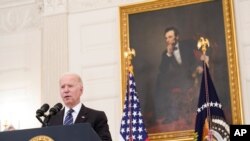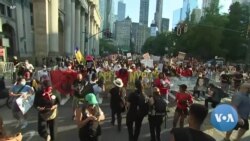As summer arrives, gun violence in major U.S. cities shows no signs of letting up, spurring the administration of President Joe Biden into action and complicating efforts to pursue criminal justice reform.
Biden, in a speech Wednesday late afternoon, is announcing a series of initiatives designed to reduce gun violence and renewed his call for Congress to adopt gun control legislation.
In New York City, there have been 194 homicides so far this year, up from 171 during the same period last year, according to the latest police data. In Los Angeles, the second-largest U.S. city, the number stands at 148 homicides, up from 121 last year, while in Chicago, the nation's third-largest city, homicides have increased to 307 this year, from 296 during the same period last year.
The spike in homicides and shootings started last summer after cities began easing COVID-19-related restrictions. According to a recent survey by the Major Cities Chiefs Association, a professional organization of police executives representing the largest cities in the U.S. and Canada, there were 8,077 homicides in 66 major U.S. cities in 2020, up 33% from 2019, which had 6,087.
The uptick has continued into this year. And with pandemic-related measures fading away as more Americans are inoculated with new vaccines, the outlook for violence in 2021 remains just as bleak, according to criminologists.
"I expect 2021 will be about as bad as 2020," said John Roman, a criminologist at NORC at the University of Chicago.
Precisely what is driving the violence remains a matter of debate. While criminologists point to the upheavals caused by the pandemic, nationwide protests over George Floyd's death and a proliferation of guns on American streets, many law enforcement officials blame a "softening" of criminal laws that have allowed thousands of offenders to avoid jail time.
Regardless, with Republicans blaming the increase in violent crime on criminal justice policies pursued by progressive mayors and prosecutors around the country, the Biden administration has responded with a slate of initiatives aimed at curbing the violence.
"Since day one of his administration, President Biden has taken action to address this increase in gun violence and other violent crime, giving cities and states the resources they need to make their communities safer," a senior administration official told reporters on Tuesday.
Targeting guns
The proliferation of guns is the chief target of Biden's anti-crime strategy. The first part of the strategy seeks to stem the flow of guns used to commit violence, the official said.
As part of the administration's response to the violence, Attorney General Merrick Garland last month announced a comprehensive strategy for reducing violent crime, and the Justice Department has since unveiled several initiatives. In May, it issued a rule aimed at cracking down on "ghost guns," homemade firearms that lack serial numbers. And on Tuesday, the Department of Justice announced that it would launch five strike forces to target illegal guns in major firearms trafficking corridors around the country.
The Justice Department is also announcing a new "zero tolerance" policy for violations by licensed firearms dealers, the official said, adding that Biden will discuss new policies "maximizing the efficacy of ATF [Bureau of Alcohol, Tobacco, Firearms and Explosives] resources to crack down on rogue gun dealers violating our law."
"We see this as a whole of department, as a whole of government, quite frankly, effort that needs to come at this problem," Deputy Attorney General Lisa Monaco said at a town hall organized by the Police Executive Research Forum on Tuesday.
Money for police
The second part of Biden's plan involves providing funds to local law enforcement agencies. To that end, the Treasury Department is announcing that communities plagued by gun violence may use some $350 billion in COVID-19 relief funds to hire police officers and fund police departments.
In an apparent reference to the Trump administration's habit of touting the number of arrests made under a major crime-fighting initiative known as Operation Legend, Monaco said the Justice Department would measure the success of its initiative "not on mere statistics about cases brought or arrests made, but on actual reduction in violence and violent incidents and in victimization.”
Biden will unveil his crime plan after meeting with a bipartisan group of mayors, community activists and law enforcement officials.
As a U.S. senator in the 1990s, Biden helped craft the controversial 1994 Crime Bill, which critics blame for the mass incarceration of African Americans in recent decades. But during the 2020 presidential campaign, he distanced himself from the bill and embraced much of the progressives' criminal reform agenda — even as he stopped short of supporting calls to "defund" the police.
Violent crime started trending higher in 2015, and there is little evidence that recent criminal justice reforms fueled the surge, said Aaron Chalfin, a criminologist at the University of Pennsylvania.
"This is a problem that's touching most big cities similarly, so it doesn't seem like specific city-level reforms are going to be a major driver," Chalfin said.
Nevertheless, many Republicans are seizing on the crime uptick to blast progressives over their purported anti-police policies.
"In some ways, the pandemic likely contributed [to the uptick]. But it is impossible to ignore that these terrible trends are coming precisely as so-called 'progressives' have decided it's time to denounce and defund local law enforcement," Republican Senate Minority Leader Mitch McConnell said in a floor speech last month.
Roman noted that historically, periods of rising violence have spurred "knee-jerk" calls for more police and punitive measures. In the 1970s and 1980s, a surge in violent crime led to stringent laws that fueled an explosion in the U.S. prison population. However, over the past decade, policymakers have increasingly questioned the effectiveness of those laws.
"We didn't arrest our way out of the violence in the 1970s and '80s, and we did other things that really helped," Roman said. "And I think we know much, much more about what our alternatives are. And maybe those alternatives are more effective than policing."







